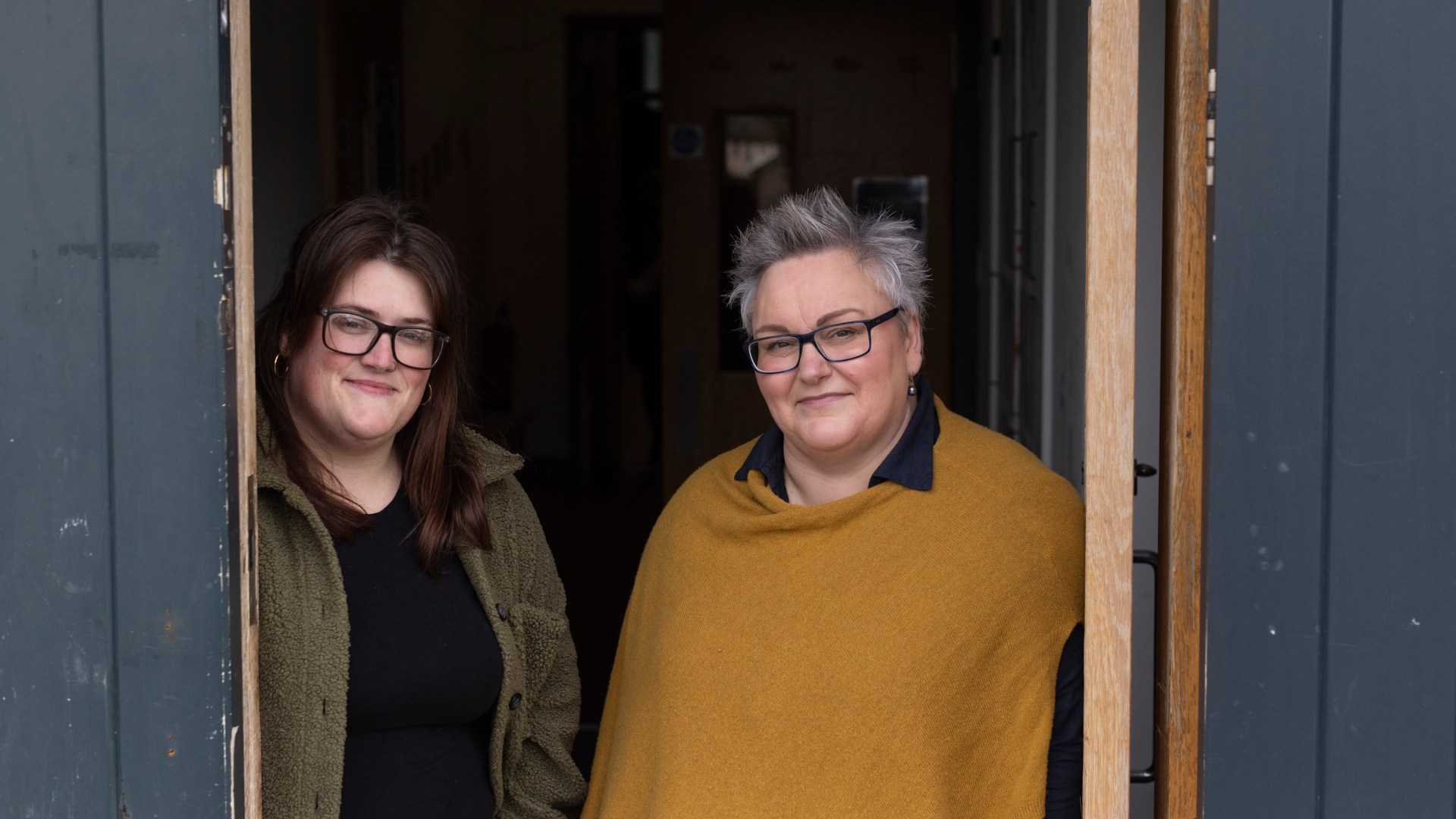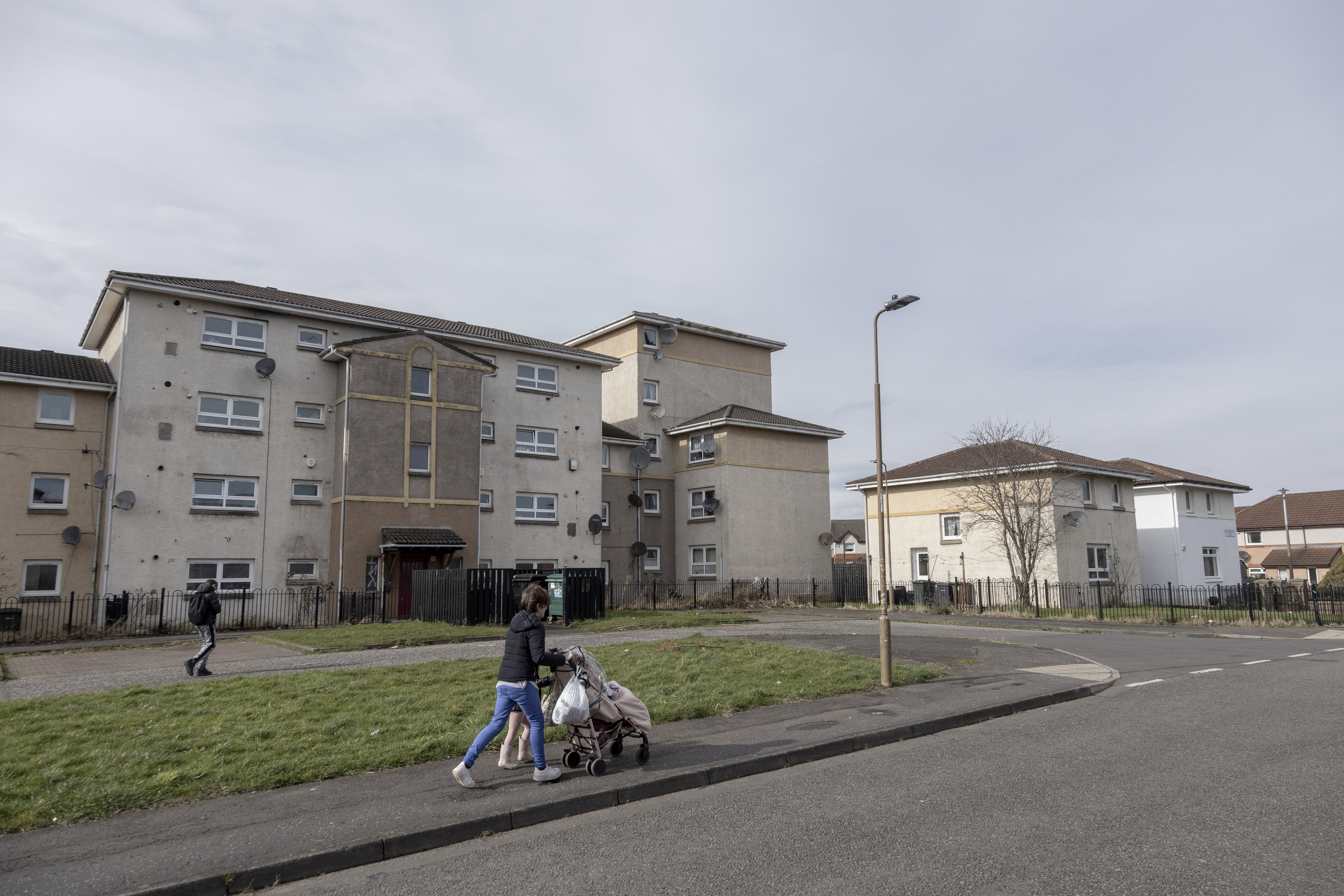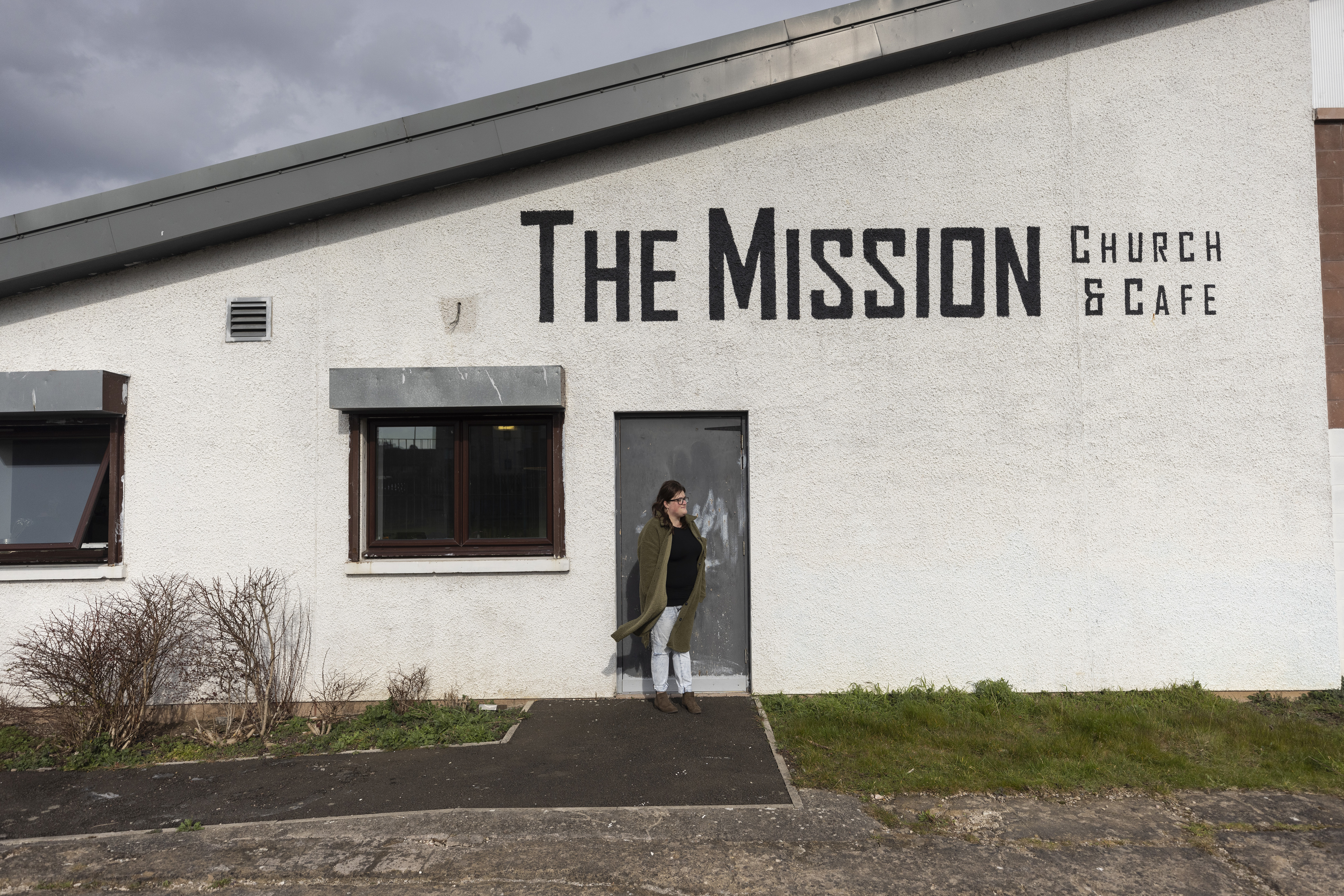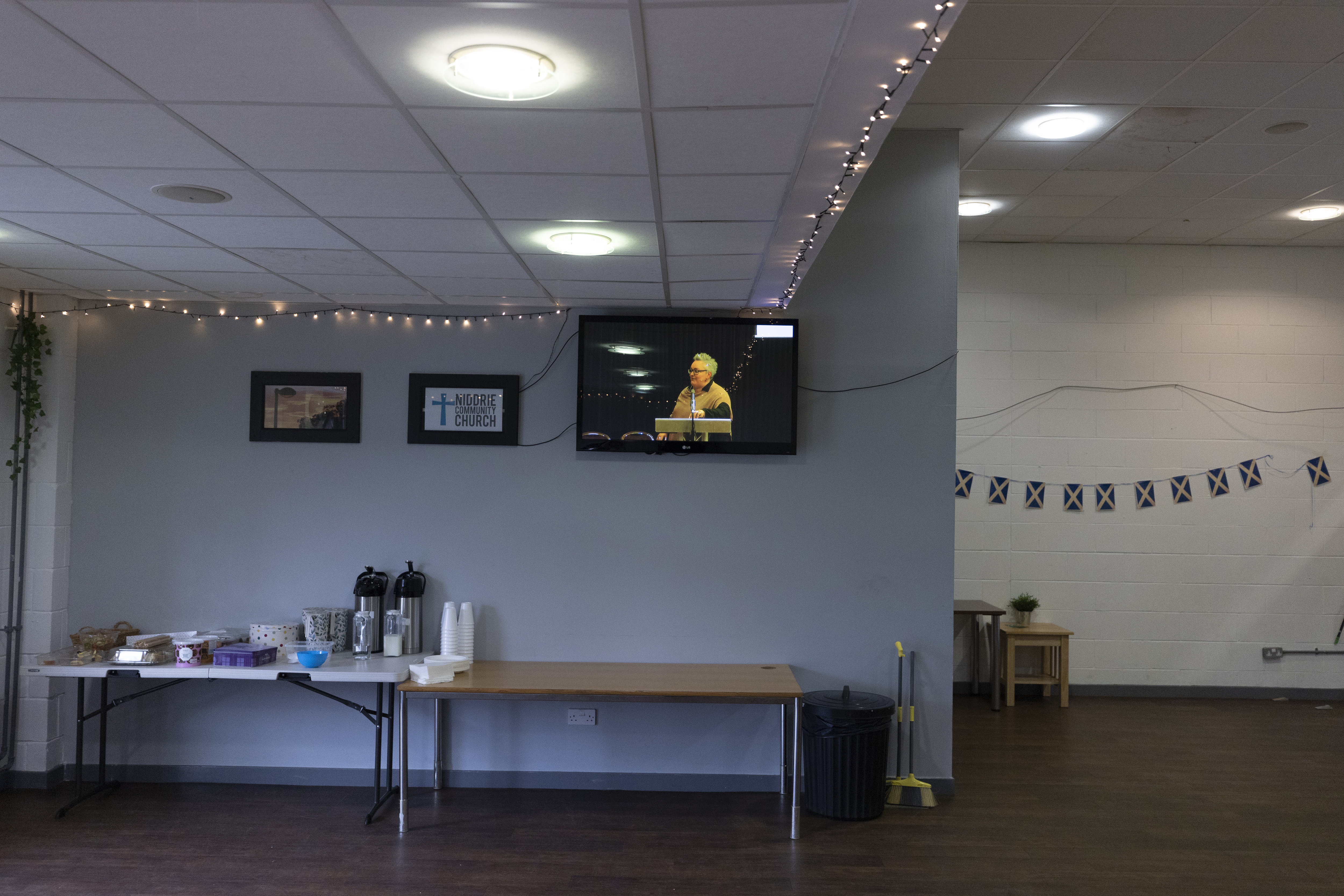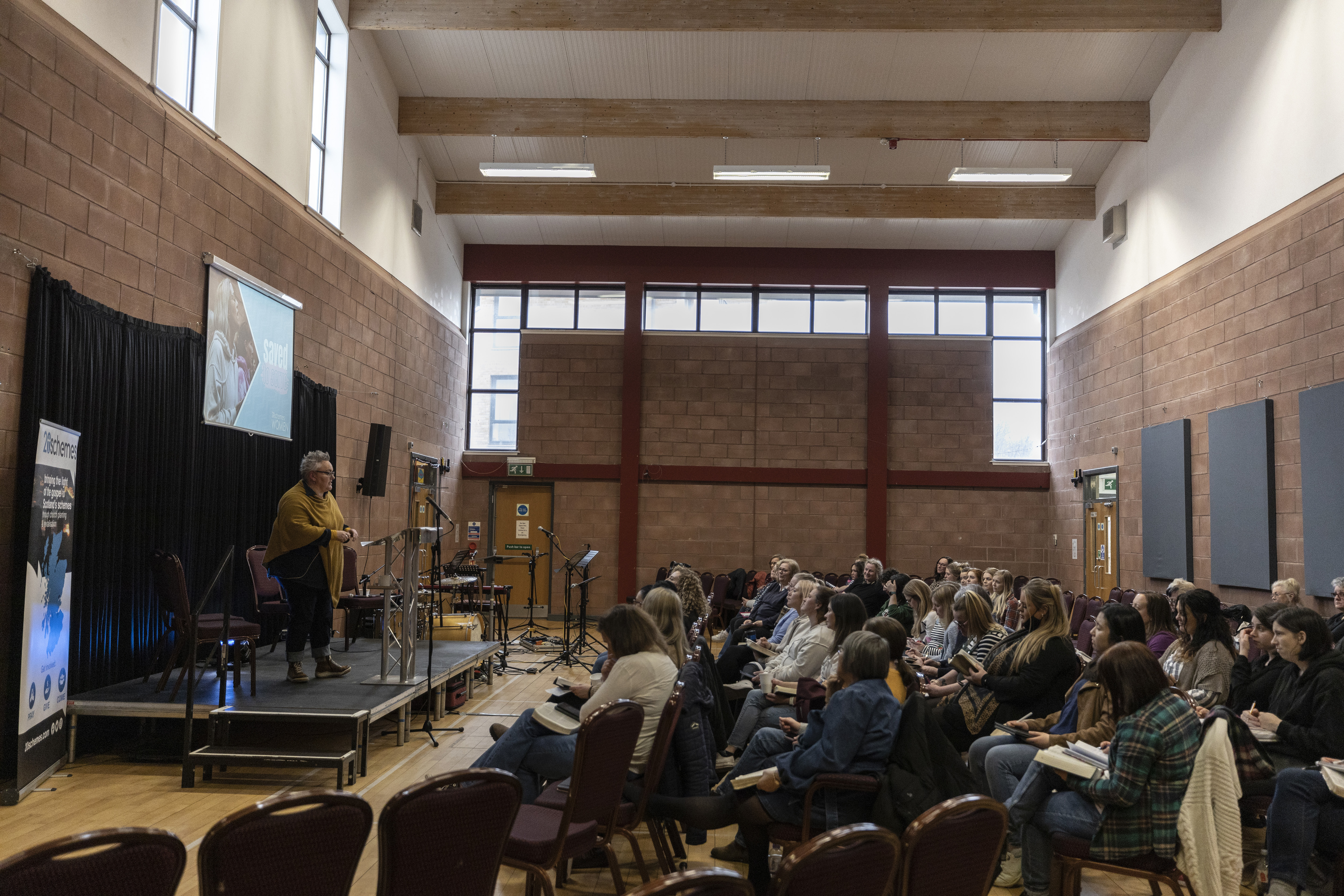On a gray and crisp Sunday afternoon last year—it happened to be Halloween—I found myself crammed in the back seat of a black-and-silver Mini Cooper, jolting over speed bumps on the narrow streets of an Edinburgh suburb.
I was returning from lunch with the pastor of a church in a gentrifying housing project, or “scheme,” southeast of Scotland’s capital.
Suddenly my new friend Tasha, a 34-year-old native of the city’s schemes, hit the brakes and rolled down her window.
“Hey!” she yelled, commanding the attention of a gaggle of middle school–aged boys. “What are you doing?” They were, in fact, throwing rocks at some second-story tenement windows. Tasha spent a minute or two chastising them, and the boys sheepishly moved on.
“I know them,” she explained, but she didn’t have to. I had already gathered that Tasha was well-known and respected in her community. Tasha, whose full name is Natasha Davidson, oversees women’s ministry at the church I was visiting, Niddrie Community Church.
The congregation is part of a growing church planting network called 20schemes, whose leaders dream of starting or revitalizing 20 churches in 20 of Scotland’s housing projects. They have six churches so far, with five more teams gearing up to plant. Schemes generally have a strong community identity and don’t intersect with neighboring schemes. As a result, 20schemes has three churches within walking distance in three distinct communities.
Personally, I was drawn to 20schemes’ focus on women. Throughout my life, I have been immersed in complementarian circles that valued women but also a theology of male headship in the church and home—first as a pastor’s kid in a small New England church, then while attending Timothy Keller’s church as a college student in New York City, and later as a Southern Baptist Theological Seminary student and a staff member for a Southern Baptist church plant.
I had participated in endless conversations and written multiple papers about women’s roles while sorting through my own views. I had witnessed churches take varying approaches to gendered ministry regardless of theological stance—from churches like mine, that offer only coed spaces, to congregations that hire women’s leaders and organize many women-only events.
And I had watched with sympathy the heated online debates among US evangelicals over doctrinal divisions and experiences of sexual or spiritual abuse among female members by male pastors.
And yet I had never quite seen anything like 20schemes. There, women are seen and called upon. There, churches actively hire women, promote women, and focus disproportionately on ministering to women.
Scheme culture is inherently matriarchal. Men are largely absent or passive in the housing projects, the leaders told me, and at least half of households are headed by single mothers. Many women have experienced violence and abuse and have a mistrust of men.
In such a context, equipping and raising up women to reach and care for their communities seems like the obvious strategy, and church leaders have embraced it. Through their local church ministries and partnership with Union School of Theology in Wales, Niddrie and the 20schemes network educate underprivileged urban women and train many of them to become church leaders.
 Kieran Dodds
Kieran DoddsThe schemes churches feel like one of the last places you would find an uncompromising doctrinal conviction of male headship. But that is what intrigued me most about 20schemes: For all its focus on women, the network holds firmly and unapologetically to Reformed theology and its distinct gender roles.
“The Bible is clear as far as I’m concerned,” Niddrie Community Church pastor and 20schemes director Mez McConnell told me. “The leadership of the church is male. The officers of the church are male. And that extends to family life. Everything else is up for grabs.”
M
cConnell is 49 and stands a mere five feet four inches tall, though he’s always sporting a beanie on his head, which affords him a few extra inches. He rarely flashes a smile, and his caustic wit often offends American upper-class sensibilities.
“These egalitarian morons hate me because they say I hate women,” McConnell told me. He says the term complementarian means little in the schemes, but he has words for that camp as well: “Complementarians aren’t training any women.”
McConnell is fiercely protective of the women in his congregation. He too knows what it’s like to be left out of leadership opportunities and excluded from theological education. In his book The Least, the Last and the Lost, McConnell recalls a church leader telling him: “Bible college isn’t for guys like you, Mez. Just stick to loving Jesus and you will be okay.”
While McConnell is not a native of the schemes, he grew up in poverty and spent time on the streets and in prison. He can relate to the culture of the schemes, where he lives with his wife, Miriam, and raised their two daughters.
“The unspoken assumption seemed to be that guys ‘like me’ didn’t need to know the Bible that deeply,” he wrote. “I never heard a voice like mine, or met a person from my background in church, except if there was a testimony night somewhere.”
Following World War I, the British Parliament passed the Addison Act to build 500,000 houses within three years—less than half of which were actually built. They were concentrated in tenement complexes run by local councils and are known as council estates. In Scotland, they are known as schemes.
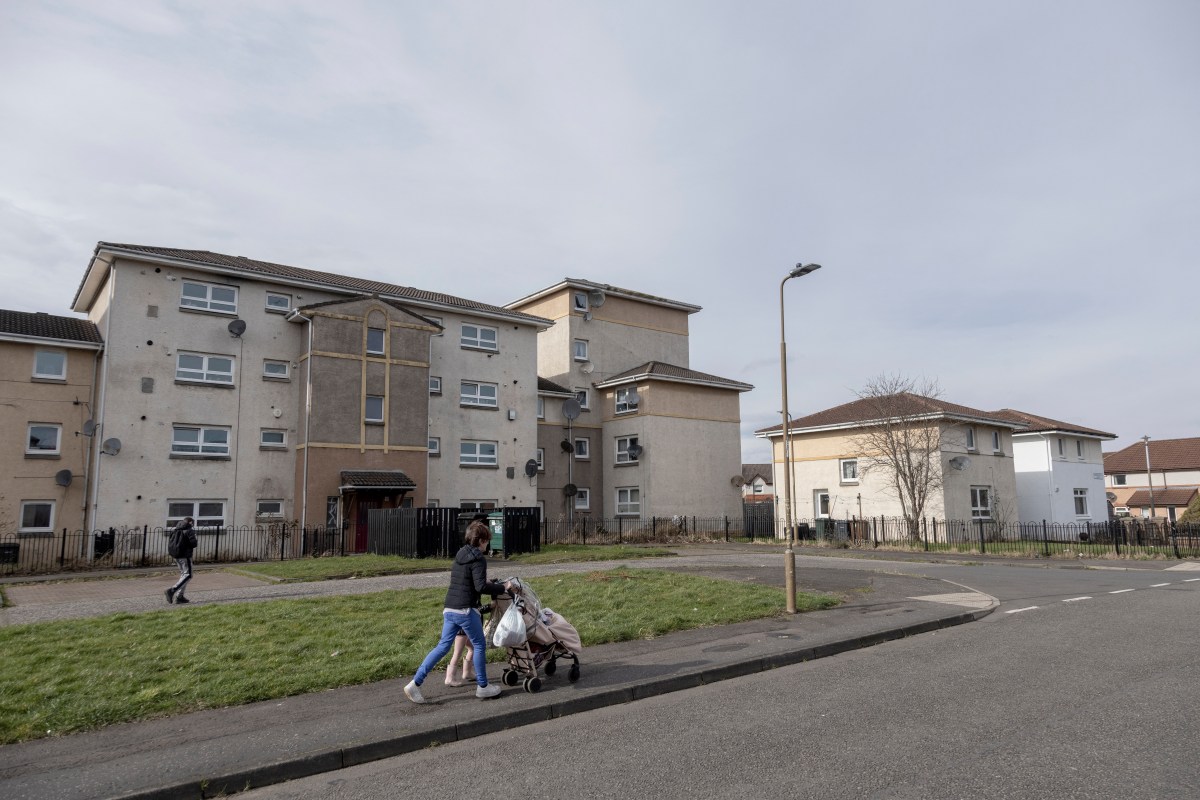 Kieran Dodds
Kieran DoddsBefore WWI, 1 percent of Britain’s population lived in council houses, but by 1938, that figure had risen to 10 percent. By 1961, it had risen to more than a quarter of the UK’s population, intensifying the division between working class and middle class.
That division has implications for church planters and leaders. Many scheme residents lack access to a car and may not have the funds for bus passes. Only a couple dozen evangelical churches are operating in Scotland’s poorest neighborhoods, according to McConnell.
“The gap between the evangelical church and those living and dying in housing schemes and council estates is as vast as it has ever been,” McConnell writes in his book. “The failing lies at the local church level. It lies with pastors and church leaders who, quite obviously, do not see gospel ministry to council estates and schemes as a priority in their towns, villages and cities.”
The complexities of poverty have drained the schemes of men. Women there—especially single women and single mothers—are particularly vulnerable and reliant on government assistance. They often face a steep uphill climb to better work and living conditions.
As Rachel Parenteau, a 27-year-old women’s worker from Ontario, said to me, “If you’re not reaching the women, you’re not reaching the scheme.”
After McConnell became a Christian, he attended seminary and moved to Brazil to become a missionary. But eventually, he became convinced that he needed to bring Christ to his own culture in the UK. McConnell became the pastor of the church in Niddrie, and, as leaders told me, he revitalized it.
It had been patriarchal, and McConnell brought theological balance: He believed in male headship yet encouraged women who felt they could never hold spiritual authority over men to come up front for congregational prayer.
McConnell’s vision for his Niddrie congregation quickly expanded into a church planting initiative, and it faced strong initial resistance from the community. To help overcome it, McConnell quickly hired Sharon “Shabba” Dickens full time as the 20schemes director of women’s ministry to train church planters’ wives and ministry interns.
About half of 20schemes interns are women, trained to be women’s workers in the church plants. And many of the interns are indigenous, meaning they grew up in the schemes.
Now, 20schemes church planters are often advised to hire a women’s worker as their first step in starting a church.
“We are training women to be teachers of the Word and to offer pastoral care, particularly in a city context where most women are single,” 20schemes executive director Matthew Spandler-Davison told me.
T
he vision to reach single women excited me. After all, I had also served as an unmarried woman on staff at a church that served a lot of single women, many of whom were fledgling Christians. I enrolled in seminary—where I was often one of only a couple of women in the classroom—with the support of my pastors, but I still felt direly unequipped to meet the needs of the number of women who sought me for spiritual counsel.
As the only woman on staff, I acted as a de facto women’s leader at the age of 25. Among other area churches in our denomination, I was one of the few paid women on staff who didn’t work with children.
I hungrily sought resources and counsel in how to disciple women, found a few partners in the work, and leaned on my seminary training. But like many women in ministry I knew, I still felt tension. Was I worth investing in? Would someone take the time to check in on me? What did a healthy relationship and partnership with the pastors look like? Would I have to fight to be heard, or would I be sought out?
I tried to envision how women could flourish in my church and churches like mine. Although I had often worked in male-dominated spaces and advocated for coed opportunities, I quickly realized the importance of creating separate spaces where men and women could seek counsel or accountability on sensitive subjects such as abortion, sexuality, and abuse.
Yet I became increasingly frustrated with the lack of gender-specific care or discipleship for women at my own church. In 2017, I reached out to Jen Wilkin, a Southern Baptist church leader I had long admired, to ask her for advice.
“A true complementarian,” she told me over a cup of coffee, “will recognize that men and women have special needs and special giftings and consequently empower each of them in those areas. You can’t say that men and women are different and then treat them like they have the same needs.”
Wilkin has made this argument elsewhere. A year later she wrote in CT that “because all-female spaces free up women to contribute, they remain a primary venue (and too often the only venue) for the identification and cultivation of female leaders in the church.”
D
uring my week in Niddrie, Tasha Davidson was often trailed by someone’s child, or several children, even as she helped run events, spoke on panels, and checked in on women in the church. With long hair that she dyes often, and occasionally sporting thick, dark glasses, she contrasts with the affluent, Instagram-influencing women’s ministry leaders who often rise to prominence in America.
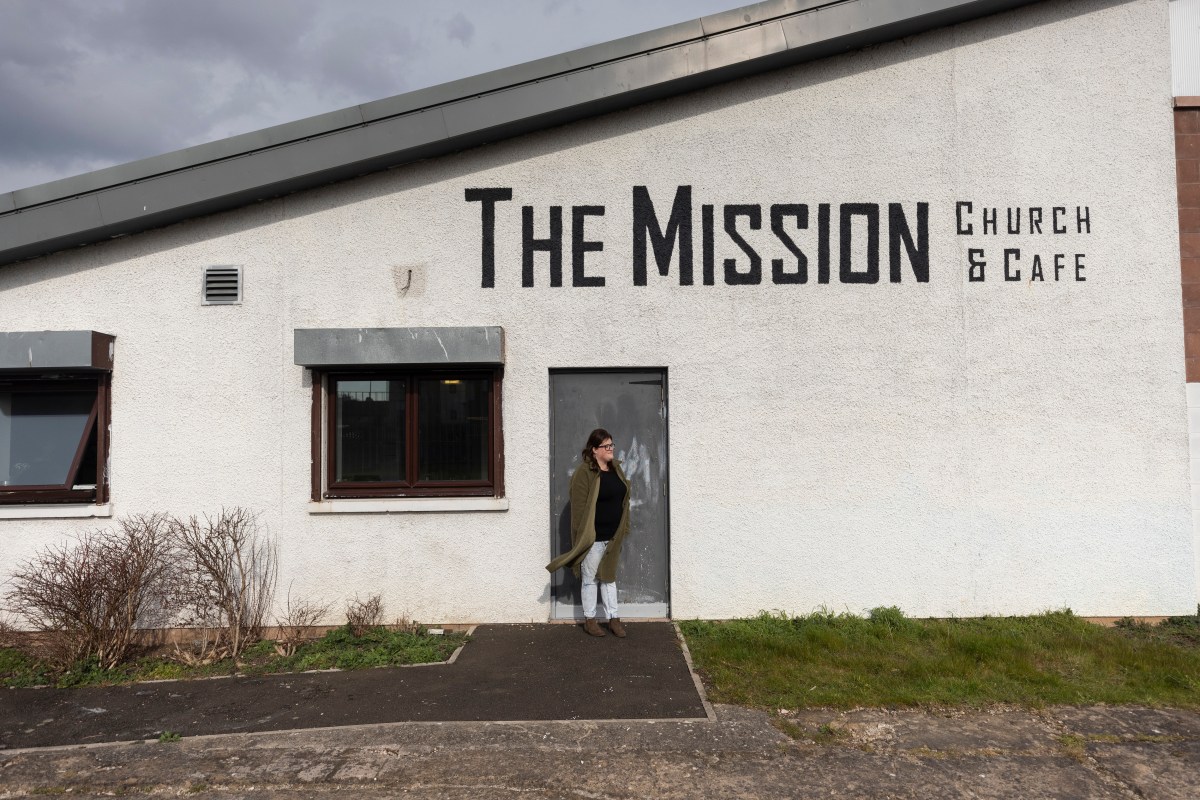 Kieran Dodds
Kieran DoddsWhen Davidson first started attending Niddrie Community Church, she often showed up hung-over or intoxicated. Like many of her friends, she had been binge drinking since she was 12 years old, even after having spent some childhood years at a rehab center while her mom recovered from her own addictions. As a teenager, Davidson said she struggled with her mental health, including self-harm and submission to authority.
But none of that was unusual in Niddrie, so “I thought I was generally a good person” compared to others, she said. After a friend brought her to church, Davidson continued to attend—for 18 months.
“My friends would ask why I was going to church, and I would say, ‘I don’t know, I’m going with my friend,’” she told me from her church office. But one Easter Sunday, she realized that she was in need of forgiveness. “I looked around and I realized these people who are so, so different love one another.”
Only a few months after she became a Christian, some of the church leaders asked her if she wanted to become an intern at the church—the first “indigenous” intern from the schemes. Soon she was working with the children in the community and leading Bible studies under the watchful eye of some of the elders’ wives.
“What we had was a lot of women who were very gifted, desperate to serve, but didn’t feel equipped for it.” – Sharon Dickens
Now, she’s enrolled in a bachelor’s degree program at Union School of Theology after completing the Ragged School of Theology, a coed Bible literacy program offered to anyone in the 20schemes churches.
But one of the biggest changes from both learning theology and interacting with church members, Davidson says, is how she views men.
“A lot of women have experienced abuse of authority, particularly the abuse of authority of men,” she said. “It was definitely a struggle when I first became a Christian. I had trouble answering to anyone, but more so a man. One of the things I’ve been grateful for about Niddrie is how the men have cared for me over the years. I’ve always felt listened to. God has used that in my life to do a lot of healing and help shape how I view men.”
Davidson, who is unmarried, was also taught a theology of male headship in the church and in the home, something she says she strongly resisted before becoming a Christian. At 20schemes, a practical implication of male headship—that only biblically qualified men can be ordained as pastors—is that all of the women run their teaching and notes by the elder team, in part for theological development and training and in part to ensure they are aligned with the elders’ teaching. But Davidson feels empowered by that accountability, not quashed by it.
“I like that because it offers a safety of, in case I teach something wrong, I’ve got these guys, they’re checking it over, and in their wisdom they will oversee,” she said. “I was really young, but they didn’t leave me by myself. I had a lot of safety net and a lot of room to flourish in the safety of other women who were mature.”
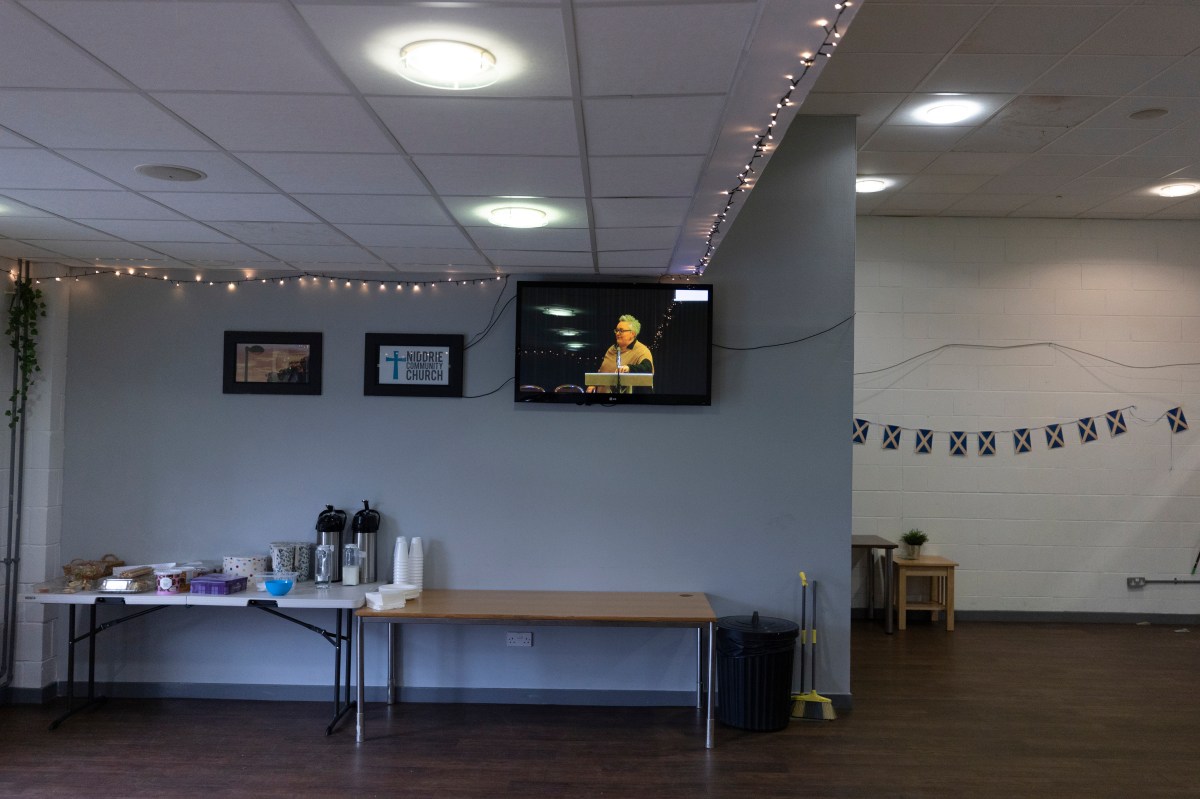 Kieran Dodds
Kieran DoddsN
iddrie Community Church meets in the middle of the scheme in a white staccato-cement church building that also serves as a café and ministry center. When I visited, it was hosting a women-only session for a biannual conference the church puts on for 20schemes leaders and some church members.
The conference, like Sunday morning services in the scheme, buzzed with the energy of a multigenerational, intimate community that knew and loved each other. Church leaders mingled and ate with members of the community, many of whom smelled of cigarettes and some of whom took plates of Scottish stovies (a hash typically made up of leftover roasts) with shaky hands. Several people leaned on crutches or canes or limped unsteadily to their seats. Church leaders and members alike dressed in hoodies and sweatpants and beanies.
One of the women speaking onstage in the small auditorium was Emily Green, a 27-year-old women’s worker from York, England. “When was the last time that we denied ourselves to love someone else?” she asked a room of 80 women gathered from around Scotland. “When did we last welcome the outcast into our home? When was the last time we gently rebuked a sister?”
It was not lost on me that most of the women preaching were under the age of 30, having been trained by Dickens and shepherded by the church’s pastors. And the questions the speakers addressed were blunt: What happens when my mentee lies to my face? How do we handle hypocritical Christians?
Green, who is petite, blonde, and easygoing, joined the 20schemes team in 2015, first as an intern and then, after two years, as a women’s worker for one of the scheme churches. “Church planting in the UK was hip and cool,” she said. “20schemes wasn’t that exciting. … Now, that’s the thing I appreciate the most, that they’re so gospel centered.”
Her work is both missional and pastoral: It combines teaching, counseling, and building community among the women in the schemes. Instead of running events, like many women’s ministry leaders in the US, she’s primarily focused on counseling and walking alongside women who battle addictions, traumas, and mental illness.
The most significant challenge is not just the spiritual warfare—Green watched one of her counselees, a recent graduate of rehab, have a “massive relapse” the night before she was supposed to be baptized—it’s her age.
“I’m so young. I’m going into women’s ministry stuff not equipped to speak into the lives of women who have been through so much and have experienced so much,” Green said. “I’m not from a council estate; my upbringing has been very different. It’s been a challenge but a really humbling thing.”
Church leaders have not only equipped her through training with a local counselor and weekly check-ins, Green said; they have empowered her. As a scheme church women’s worker, she works in tandem with the male pastor, functioning as almost a women’s pastor. She calls on women at their homes, with or without the pastor, and meets regularly with women for biblical counseling appointments. Sometimes, her job is simply the tedious work of building trust and relationships in the scheme.
B
efore I visited the schemes, I called Dickens, 20schemes’ women’s director, over Zoom. She was bundled up in blankets at her tenement house on a December afternoon. She sits at the heart of the network’s strategy for reaching its communities, and I wanted to hear her story.
Dickens, 51, may stand out at her church with her spiky white hair, but she prefers to lead quietly in the background, serving as sort of a mentor or mother figure for the younger single women in the schemes. Raised in a scheme in northern Edinburgh, Dickens found Jesus at the age of 18 following her violent and abusive boyfriend’s radical conversion to Christianity.
“I found that harder to deal with than the violence,” she said. “I couldn’t understand.”
When she finally converted, she went “all out” and worked as a voluntary missionary for a year—right after receiving a technical school certificate. Her parents, who had long pushed her to escape the schemes, “would have felt better if I was on drugs,” she said. “They thought I was being taken over by a cult.”
The year of service turned into four and led to more jobs in the social sector, including working with churches, and finally with Niddrie Community Church and 20schemes. Now, although Dickens is a divorcée and has always lived in the schemes and understands the culture, her friends tease her about being “middle class.” She owns a car and has a university degree, as do her two children.
“Women are struggling with drugs, alcohol, interpersonal violence, anger, impurity, and parenting in the schemes,” she said. “But affluent areas struggle with similar things. When I first started working with women, I thought it was only women in schemes, but when I traveled in affluent areas, I realized that many women struggle with these bigger issues, but just in a different way.”
The “different way” in the schemes means that many of the struggles are compounded—five of those things at the same time. Someone may have massive debt combined with mental illness or addiction, or chronic illness combined with childhood trauma. And in the schemes, these issues are public struggles in a tight-knit community, unlike the private way congregants at more affluent churches might hide embarrassing matters.
“We have an idealistic image of what a Proverbs 31 woman is,” she said. “The idealistic picture is she’s like Mary Poppins, ‘perfect in every way.’”
Dickens said there is an assumption in the church that women don’t struggle with sins like beating their kids, alcohol addiction, extramarital sex, and porn. “Trouble is, they do.”
“The majority of Christian context is middle class and suburban. It doesn’t speak the same language as ours,” she told me over lunch in Niddrie.
For example, many counseling books are short handbooks for complex topics. “In our case, they’re not ‘complex’ issues, they’re everyday issues,” she said. Women in the schemes are unlikely to have a therapist and more likely to have an “auntie” who’s been involved in their life for 10 years rather than 10 weeks.
“We started writing resources and training because we couldn’t find anything that met our needs,” Dickens said. “What we had was a lot of women who were very gifted, desperate to serve, but didn’t feel equipped for it.”
The church created its own discipleship curriculum, piloting a two-year women’s ministry worker course in 2018. Dickens also leads a monthly group where around 40 female church leaders gather for a Bible study and rotate teaching. Their focus is discipleship, she said, which drives which events they run.
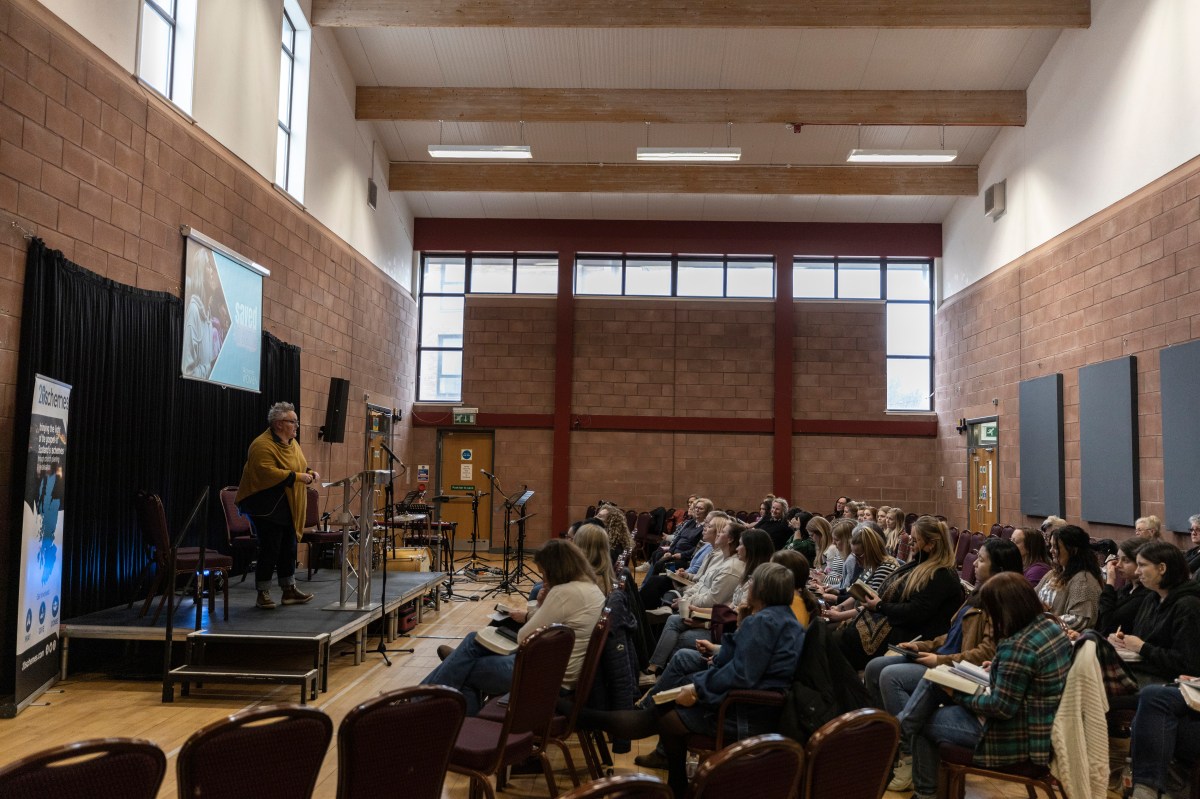 Kieran Dodds
Kieran Dodds“What has struck me about some of the women’s workers I’ve met is that they all seem focused on leading Bible studies, organizing events or doing individual studies,” Dickens wrote in her book Unexceptional: Ordinary Women Doing Extraordinary Things through God. “I haven’t heard any chat of living life with women … 24/7-style discipleship or even evangelism. Their women’s work feels tidy, events-driven, structured, organized, with proper boundaries in place.”
Dickens’s philosophy struck me. In my search for affirmation by church leaders, was I seeking empowerment and equipping to engage in discipleship and hard conversations? Or was I grasping for power and recognition? In retrospect, it was probably both.
Spending time with the women at 20schemes helped me recognize that Niddrie’s church modeled what I had been longing for throughout the past decade. While refusing to apologize for their theological convictions on gender roles, male and female leaders of 20schemes work tirelessly to minister to marginalized and vulnerable women and equip them to care for their own.
“I’m always so grateful to God that he saved me in Niddrie church—it’s not perfect, we’re all sinners, but there’s room to flourish,” Tasha Davidson said. “There’s not a focus on the things we can’t do, that’s never been the issue. It’s been a conversation of ‘This is what you can do.’ I think that’s changed our focus.”
When I pressed Dickens on how she felt about the church’s position on male headship, she didn’t waver.
“When it comes to women’s ministry, we spend a lot of time talking about the theology of women’s ministry, but very few people talk about practice,” Dickens said. “We spend a lot of time talking about the 3 percent of ministry that we don’t have access to, but very rarely do we talk about the 97 percent of ministry that we should be doing.”
I felt Dickens scolding me. Or maybe, it was the Holy Spirit.
Kara Bettis is an associate editor at Christianity Today.

